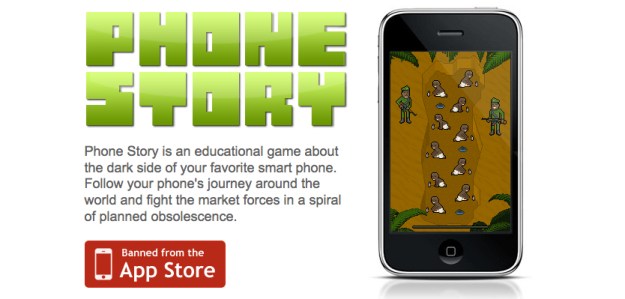 A game that focused on controversial aspects of the smartphone manufacturing process received approval from Apple and was placed in the App Store on Saturday. Three days later, however, it was pulled.
A game that focused on controversial aspects of the smartphone manufacturing process received approval from Apple and was placed in the App Store on Saturday. Three days later, however, it was pulled.
As reported by the New York Times, the 99-cent game, called Phone Story, tracked the life of a mobile phone, from the mining of precious metals required for making the device to factories in China where the phones are assembled.
The blurb on the game’s website says: “Phone Story is a game for smartphone devices that attempts to provoke a critical reflection on its own technological platform. Under the shiny surface of our electronic gadgets, behind its polished interface, hides the product of a troubling supply chain that stretches across the globe.”
It continues: “Phone Story represents this process with four educational games that make the player symbolically complicit in coltan extraction in Congo, outsourced labor in China, e-waste in Pakistan and gadget consumerism in the West.”
Its creator, Paolo Pedercini, a game designer and professor of art at Carnegie Mellon University, hoped that Phone Story would “generate some discussion about hardware and our socioeconomic impact as consumers of electronics.”
“But now it’s becoming more about market censorship,” he said.
According to screenshots posted by business blog BLN, part of the game appears to involve having to catch people jumping off a building. The website for Phone Story has a page highlighting the troubled past of the Foxconn factories in China which manufacture Apple’s iPhone. “Over the span of a few months, more than twenty workers committed suicide out of extreme desperation,” it says on the website.
According to the NYT report, Pedercini had been planning to donate any profits from the game to groups that are working to protect labor rights, as well as to organizations that “are working to stop the horrors represented in the game.”
Pedercini told the NYT that he wanted to use a bit of “dark humor” to get the game — and therefore the issues it raises — noticed. The ban may have inadvertently helped his cause.
Apple told Phone Story’s designer that any game that contained crude or objectionable content would be banned from the App Store. The fact is, someone at Apple must have approved the game for it to have made it into the store on the weekend. Perhaps the employee had a sense of humor similar to Pedercini’s and saw nothing wrong. Interestingly, the ban came shortly after Pedercini tweeted “the anti-iPhone game for iPhone” when promoting the game. Did Apple simply take offense to this message?
Pedercini responded to the ban by saying: “Although this game can be seen as disturbing on an intellectual level because it links back to a real-world analogy, the game itself wouldn’t scare a kid. There’s much worse stuff on the Internet and the App Store.”
Android users might be interested to know that Phone Story may soon be coming to a smartphone device near you.



